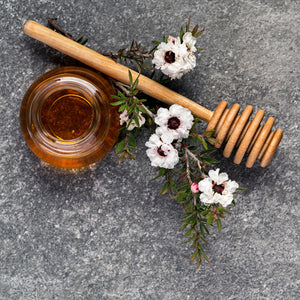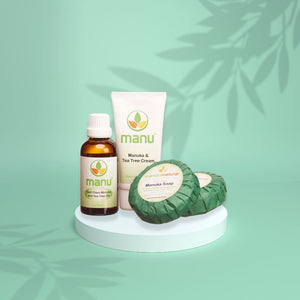
Healing open and infected wounds with Medical Manuka honey
An ancient 4.68 metre Egyptian scroll reveals how you can heal open wounds with honey
Is it safe to put manuka honey on an open wound?
An ancient Egyptian medical text called Edwin Smith Papyrus which could easily be a manual of military surgery describes 48 cases of injuries, fractures, wounds, and tumors.
Among some practices were bandaging, splints, stopping the bleeding with raw meat and treating open wounds, and curing infections with honey.
Ancient Egyptians made a mixture of honey and vegetable fibers as a treatment
for open wounds.
In those uncertain times, the physician ( the precursor of the modern MD) judged the patient chances for survival and made one of the three diagnoses:
“An ailment
which I will treat,
“An ailment with which I will contend, and
“An ailment not to be treated.”
So, what does your doctor tell you when you have a wound that won’t go away?
Honey is an ancient antibiotic
Egyptians didn’t know about manuka honey!
No, they didn’t, but can you imagine if they did?
They had honey from black seeds ( Nigella sativa ), date palm, raw clover, anise, acacia…etc. And they were aware of honey’s potency.
But, manuka honey is more potent for wound care than other kinds of raw honey.
It is a complex mixture of carbohydrates, fatty acids, proteins, and minerals. In addition, it contains high levels of phytochemicals such as phenolic compounds and flavonoids that benefit health.
However, manuka honey is exceptional thanks to the content of the following three components.
Methylglyoxal
(MGO)
Dihydroxyacetone (DHA) – a component of Manuka’s nectar
Leptosperine – a component of nectar from Manuka
One of the most powerful substances is methylglyoxal (MGO).
MGO is a substance that can be found in other types of honey. But, unlike in manuka honey, it is there in very small quantities.
There is a reason why we say that manuka honey is excellent for open wounds. The primary type of antibacterial activity in other sorts of honey, peroxidase-based, can’t neutralize catalases present in blood and serum.
How does manuka honey treat open wounds?
Manuka honey can help treat various types of bacteria that usually infect wounds.
Prof. Rose Cooper of the University of Wales Institute Cardiff (UWIC) found that manuka honey prevents bacteria from attaching to the tissue, which necessarily occurs in the process of infection.
When Sterile Medical Manuka honey is placed on the wound, it absorbs water from the wound and dries it. Then, antimicrobial substances destroy microorganisms that can infect the wound.
You can completely cover the treated area and wrap it with a sterile bandage, changing the application once a day.
It is effective because it penetrates deep into the skin.
The viscosity of honey is essential as it allows the honey to create a
protective barrier that prevents infections in the wounds. Besides, the high
content of sugars can improve the nutrition of the damaged skin.
It’s like a nursing food for baby skin.
Honey also facilitates the deodorization of infected wounds. Besides, the low pH of honey could help create and maintain optimal conditions for the growth of a major cell block that secretes collagen proteins.
In addition, this high-potency raw honey produces H2O2, which at physiological concentrations, acts as a “messenger” modulating the different cell signaling pathways involved in the repair of wounds. This is why you should consider manuka honey for open wounds.
Unlike antibiotics, UMF Manuka honey does not produce resistant bacteria. The so-called superbugs develop after being exposed to common antibiotics on a couple of occasions.
Sterile Manuka Medical honey for open wound treatment, skin conditions, and more!
Relatively new research suggests that manuka honey can help to speed up the healing process of open wounds, regenerate tissue and alleviate pain in patients with burns.
But there is more;
Probably your favorite thing about this natural product is that it’s like Windex, meaning you can use it for just about anything.
ACNE
Using manuka honey on your face once a day may cure your stubborn acne, thus improving your complexion with clarity and moisture.
At first, especially if you have open acne sores, it might burn or tingle, but that’s normal! Manuka honey is antibacterial & simply cleaning out the wound will significantly improve your mirror reflection.
Soon enough, you could see that the breakouts you had are going down, and by a second week, they may heal and go away with no new blemishes coming up.
You can use about a tablespoon and apply it all over your face and neck for 20-30minute at least five days a week. When the time is up, massage any excess honey into the skin, and rinse with warm water to remove stickiness.
Manuka honey is also great to help you heal acne scars. You can put a little all over your ex acne zone and then add a few drops of water to thin it out so it’s not sticky.
In this way, you could use it as an overnight mask. It’s not pretty, but, hey, the results are!
STAPH INFECTION
Staph infections are caused by bacteria called staphylococcus. They most often affect the skin. They can go away on their own, but sometimes they need to be treated with antibiotics.
But what when you or your kid is not getting better from just antibiotics? Yes, Bactrim and Mupirocin may clear that temporarily. However, antibiotics may give you diarrhea, sleep loss, dry patches, and armored resistance to more antibiotics.
And you may be terrified that this would turn to MRSA.
By now, there are many types of research about healing wounds caused by staph with manuka honey. (1) One of them proves that honey may work well on its own to treat chronic wounds. Still, it can also support the use in situations where an additional systemic antibiotic is desirable.
You can apply it with gauze pads on the places where the issue started – once before bed and once in the morning after a shower.
To speed the recovery, you can also eat a spoonful of manuka honey a day right before breakfast and after a glass of water.
MRSA
MRSA is usually spread in the community by contact with infected people or things carrying the bacteria. If left untreated, MRSA infections can become severe and cause sepsis—the body’s extreme response to an infection.
When you go to the doctors with diagnosed MRSA, it seems that they don’t seem overly concerned. It’s like, “MRSA is everywhere now. You can catch it anywhere,” But many times, not even four rounds of antibiotics are not enough to get you off this pests, leaving you with destroyed good gut bacteria.
Researchers singled out three particularly nasty bacteria: two strains of staph bacteria, MSSA (methicillin-susceptible Staphylococcus aureus) and MRSA (methicillin-resistant Staphylococcus aureus) and one called Pseudomonas aeruginous (PA).
All of them, even bacteria growing in a biofilm, a thin, slimy layer formed by bacteria that protects them from antibiotics, were receptive to honey. (2) It’s not uncommon that blisters or boils could appear as a sign that you have MRSA.
As a side effect this nasty condition can leave a deep open wound – that now you can face with manuka honey’s power.
The bad guys in a sticky situation
Just glove, clean the wound, re-apply the sterile manuka honey, change the bandages each day, and the wound will close itself in a matter of days.
The people with the most successes in beating this back for good are using a combination of Hibiclens wash to shower with for 10 days, disinfecting all bedding, surfaces in the home, and of course using the Manuka honey for wound treatment.
PRESSURE SORES
Pressure sores often appear among the elderly population because of their fair share of accidents. Often than not, doctors will schedule surgery to remove the dead tissue. Or give you the instruction to clean the sores with saline spray for the next two-three months.
A recent medical development is Manuka honey alginate dressings to assist the healing of infected wounds, burns and ulcers.
This treatment is particularly effective in treating leg ulcers in older people.
The sterile dressings are complimented by Activon sterile Manuka honey.
Manuka honey gets 5+ stars on dealing with pressure sores. When you apply manuka honey to the problematic area, the wound will stop oozing and show new skin growth.
It may shrink a little every day, and it may be entirely healed within two or three weeks.
A RECLUSE SPIDER BITE
The brown recluse spider bite can be very harmful to a victim because its toxin begins breaking down skin tissue which causes an area of damage known as necrosis or dead flesh due to rapid spreading throughout the victim’s system.
You can use manuka honey every day for a week to heal the tissue and to safely close the wound.
CRACKED NIPPLES
There is a common misconception that breastfeeding and sore nipples go hand in hand. The truth, however, shows us that this isn’t always the case at all – some mothers may end up with cracked nipples early on due to their baby’s positioning.
Apply manuka honey at each nipple at the time.
A stinging sensation is normal when applying the dressing to your open wound.
Also, the color may change as fluid, and dead tissue is drawn away from the
wound, so initially, you might notice that it looks larger than before.
After using it for 24
hours, discard the dressing and replace it with a new one if
your nipple wound is not healed.
Everything else and beats NEOSPORIN
Manuka honey is a medicinal gem!!! You can put it on burns, use it for cuts where slightly numbs the pain, bee sting, jock itch, foot lesions, for all kinds of rashes, facial mask, and what once would have formed a scar, with manuka honey will heal without a scar visible!
Also, you can try and mix a little honey with water to make drops. It may help
for the ear pain to go away.
In the end …
Ancient culture teaches us that any honey is good for healing open wounds.
However manuka honey does it exceptionally thoroughly and faster.
Believe it and use manuka honey on open wounds and scrapes. This thing helps maintain tissue moisture without oversaturating and leading to wound dehiscence. Works wonders on large open wounds where all skin has been lost, stopping the bleeding and providing an environment for rapid cell production.
Take control of your treatment plans, be aggressive in treating, and learn all you can about what you’re facing.
You are your body’s best advocate.
Oh, and we must not forget the edible part. Manuka honey is excellent with nut butter on English muffins.
ORIGINALLY PUBLISHED on blog.manukanatural.com


